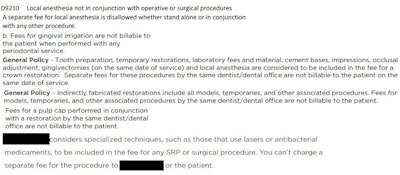No matter our daily role -- be it provider, management, or billing -- we have all spent our fair share of time in the dental chair as a patient. As a patient, have you ever felt that something was "off" about how the billing was handled at your doctor's office?
 Julia Nevodcikova.
Julia Nevodcikova.
Do patients complain about your practice's billing? Perhaps it's a sign to take a deep dive into your systems to see what is frustrating your patients. When insurance becomes a variable in the billing process, it becomes more complicated. Now we have to trust a third party for payment to keep our doctor-patient relationship strong. And if insurance does not pay as expected, well, we all know how that goes, right?
Here's the thing ... if we simply polish our financial conversation skills and do not engage in poor billing practices, patient frustration goes out the window. Avoid these common billing issues to ensure patient satisfaction and retention.
Being untruthful about coverage and how it works in your office
If you do not participate in a patient's plan, do not give the impression that you do. Patients do not have the level of understanding that you have about their insurance. They perceive everything you say at their level of knowledge, which often leads to misinterpretations.
A patient may have a large balance following a simple preventive visit that they assumed would be fully covered. Why did they assume this? Because you took their insurance and did not explain how out-of-network benefits work ... which now reflects very negatively on the practice. In fact, now that trust has been broken, it is likely that your practice will not be given a second chance.
Misrepresenting all-inclusive services as noncovered services and not submitting them on the claim form
For many in-network insurance plans, numerous services are considered all-inclusive. This means that those services cannot be charged to the patient, according to the provider handbook. Such services may include material upgrades, gingival irrigation during scaling and root planing visits, using desensitizer during a crown prep visit, administering local anesthesia, and more.
Because these services are labeled "all-inclusive," it is not ethical to present them to patients as not covered. Collecting in full and omitting the services from the claim form entirely goes against many insurance contracts and provider handbooks.
Patients will receive an explanation of benefits (EOB) and question the mismatched insurance explanation of payment with their treatment plan from the office. Patients may call their insurer for clarification, and those representatives will not defend your practice. It may leave patients feeling misguided regarding their insurance coverage, and they may sever ties with your practice altogether.
While we can agree or disagree, in-network providers have agreed to follow the insurance rules listed in their contracts and provider handbooks. Although I may not agree that many of these services should be all-inclusive, by signing the contract with the insurance company, you agree to abide by their rules. That's the catch.
My advice is to read those plan booklets, provider handbooks, and contracts, and look closely at each plan to see what is allowed and what's not. The patient's coverage contract may actually allow for additional services to be billed to the patient. To find this out, you will need the patient's version of their contract. Unless you have read that document, it's not a good idea to collect for services that you know will be deemed all-inclusive.
Here are some examples of the verbiage dentist handbooks have regarding all-inclusive services. Note that they are referred to as "disallowed" and "not billable."

Delayed billing
Avoid surprising your patient with a bill six months after their visit when all appeal options are exhausted. You should immediately notify patients regarding any denials and let them know you are working hard to appeal the decision.
Continue to be transparent with the patient and inform them they may have a balance to pay if an appeal is denied and insurance does not cover as per the initial estimate.
Failure to update insurance plan details
Plans change every year and not updating plans may put you at a disadvantage. We see plans change drastically from full coverage to preventive only, from 100% coverage on all services to 80% or 50%, and even from a preferred provider organization plan to a dental health maintenance organization plan.
While patients should know their benefits, this is most often not the case. You have the advantage of checking their benefits online to ensure the plan in your system is still up to date and has not changed.
Failure to address billing discrepancies
Ignoring patient inquiries or complaints about unclear bills will simply not put an end to patient irritation. Discrepancies can include the amounts submitted to insurance not matching what you are charging a patient, procedures omitted from the claim, and different patient balances on the EOB compared to your invoices. Speak to patients regularly and let them know you are taking all steps necessary to address their concerns in a timely fashion.
All of the above practices contribute to a poor patient experience and can damage trust between healthcare providers and patients. Clear communication, transparency, and accessible support are key to fostering a better patient experience with billing.
What are some strategies your practice can use to enhance the financial experience for patients? Download our checklist to turn frustrated patients into happy ones.
Julia Nevodcikova is the founder and CEO of Stellar Dental Solutions, a dental billing company serving dental offices across the U.S. She holds a master's degree in accounting from SUNY Polytechnic Institute in Utica, NY. Nevodcikova is passionate about helping practices streamline their billing systems to prevent revenue loss while supporting healthy, sustainable growth.
The comments and observations expressed herein do not necessarily reflect the opinions of DrBicuspid.com, nor should they be construed as an endorsement or admonishment of any particular idea, vendor, or organization.



















